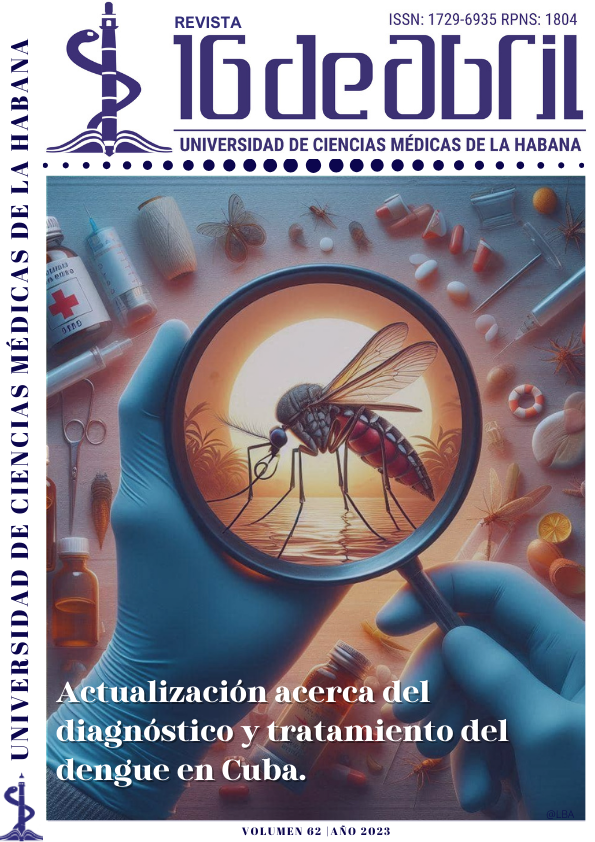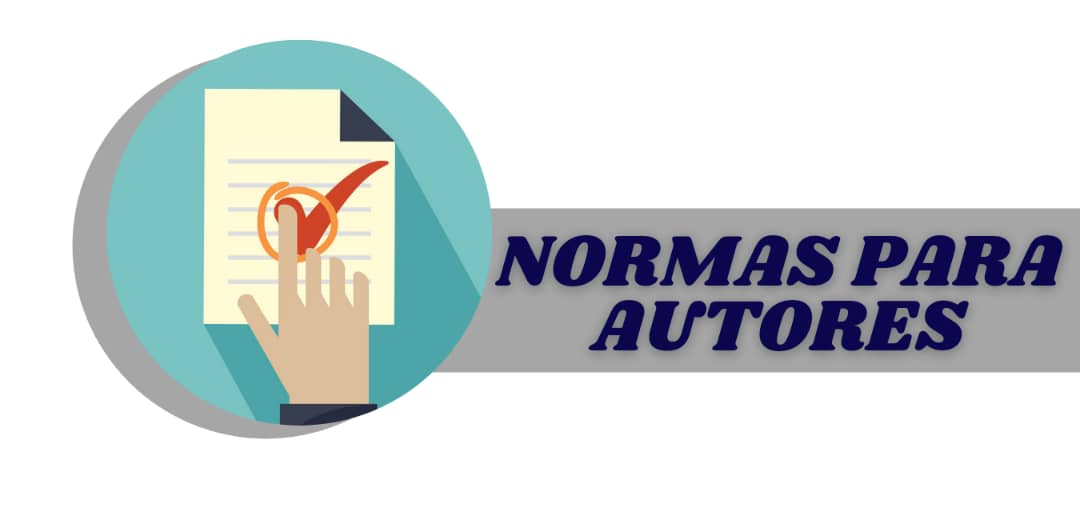Actualización acerca del diagnóstico y tratamiento del dengue en Cuba
Palabras clave:
Aedes, dengue, dengue grave, virus del dengue.Resumen
Introducción: el dengue es una enfermedad viral frecuente en países de Asia, África y América Latina. Un correcto diagnóstico y tratamiento del paciente puede establecer diferencias que permitan una evolución favorable.
Objetivo: describir las tendencias actuales para el diagnóstico y tratamiento del dengue en Cuba.
Método: se realizó una búsqueda de información en las bases de dato PubMed/Medline, Scopus y SciELO, mediante la combinación de términos. Se seleccionaron 30 fuentes.
Desarrollo: aunque el diagnóstico de caso sospechoso de dengue es fundamentalmente clínico, las pruebas de diagnóstico consisten en pruebas serológicas en el período agudo y de convalecencia, detección de antígenos y detección del genoma viral por reacción en cadena de la polimerasa en sangre. En Cuba se hace la determinación específica del anticuerpo IgM para dengue, al realizar una extracción de sangre después del quinto día de la enfermedad. A pesar de que no existe un medicamento específico para tratar esta enfermedad, actualmente si existe un tratamiento basado en las manifestaciones clínicas que demuestra reducir la mortalidad, al establecer las conductas a seguir por grupo de riesgo de dengue, y permitiendo individualizar cada caso particular.
Conclusiones: el diagnóstico y tratamiento del dengue en Cuba se realiza por esquemas bien definidos y organizados, establecidos por la Organización Mundial de la Salud. Aunque existen estrategias de control de la enfermedad que contribuyen a la prevención, conocer con detalle el tratamiento de la misma garantiza al máximo la calidad de la atención médica, así como la disminución de la morbilidad y la mortalidad.
Citas
2. Salles TS, da Encarnação Sá-Guimarães T, de Alvarenga ESL, Guimarães-Ribeiro V, de Meneses MDF, de Castro-Salles PF, et al. History, epidemiology and diagnostics of dengue in the American and Brazilian contexts: a review. Parasit Vectors [Internet]. 24 de abril de 2018 [citado 1 de marzo de 2023]; 11(1):264. Disponible en: https://doi.org/10.1186/s13071-018-2830-8
3. León JST, Sarmiento LAD, Sandoval ES, Gómez HJM, Carreño WDM. Historia del dengue en las Américas, perspectivas y evolución histórica epidemiológica, así como su horizonte a futuro. Ciencia Latina Revista Científica Multidisciplinar [Internet]. 30 de agosto de 2022 [citado 3 de marzo de 2023]; 6(4):2551-73. Disponible en: https://ciencialatina.org/index.php/cienciala/article/view/2781
4. Soneja S, Tsarouchi G, Lumbroso D, Tung DK. A Review of Dengue’s Historical and Future Health Risk from a Changing Climate. Curr Environ Health Rep [Internet]. septiembre de 2021 [citado 3 de marzo de 2023]; 8(3):245-65. Disponible en: https://doi.org/10.1007/s40572-021-00322-8
5. Duran García RM, Capote RE. Historia del dengue en Cuba. Repositorio de Recursos Educativos de la Biblioteca Virtual de Salud [Internet]. 2019 [citado 3 de marzo de 2023]; Aprox. 12 pág. Disponible en: http://recursosuvs.sld.cu/index.php?P=FullRecord&ID=116
6. Pereda OP, Rubio DG, Tirado MGG, Peraza OC, Torres EM. Descripción clínica de niños fallecidos por dengue hemorrágico durante la epidemia cubana de 1981. Revista Cubana de Pediatría [Internet]. 31 de marzo de 2022 [citado 3 de marzo de 2023]; 94(2). Disponible en: https://revpediatria.sld.cu/index.php/ped/article/view/1995
7. Gutiérrez LA. Epidemiological Update for Dengue, Chikungunya and Zika in 2022. PAHO/WHO Data – Annual Arbovirus Bulletin 2022 [Internet]. 2023 [citado 3 de marzo de 2023]. Disponible en: https://www3.paho.org/data/index.php/en/mnu-topics/indicadores-dengue-en/annual-arbovirus-bulletin-2022.html
8. Sojos BYB, Montalvo GDL, Gorozabel MSS, Moreno LGV. Fisiopatología del dengue. RECIMUNDO: Revista Científica de la Investigación y el Conocimiento [Internet]. 2019 [citado 3 de marzo de 2023]; 3(Extra 3 (ESP)):622-42. Disponible en: https://dialnet.unirioja.es/servlet/articulo?codigo=7402240
9. Wong JM, Adams LE, Durbin AP, Muñoz-Jordán JL, Poehling KA, Sánchez-González LM, et al. Dengue: A Growing Problem With New Interventions. Pediatrics [Internet]. 1 de junio de 2022 [citado 3 de marzo de 2023]; 149(6):e2021055522. Disponible en: https://doi.org/10.1542/peds.2021-055522
10. Raafat N, Blacksell SD, Maude RJ. A review of dengue diagnostics and implicationsforsurveillance and control. Trans R Soc Trop Med Hyg [Internet]. 1 de noviembre de 2019[citado 3 de marzo de 2023]; 113(11):653-60. Disponible en: https://doi.org/10.1093/trstmh/trz068
11. Harapan H, Michie A, Sasmono RT, Imrie A. Dengue: A Minireview. Viruses [Internet]. 30 de julio de 2020[citado 3 de marzo de 2023]; 12(8):829. Disponible en: https://doi.org/10.3390/v12080829
12. Rosenberger KD, Lum L, Alexander N, Junghanss T, Wills B, Jaenisch T, et al. Vascular leakage in dengue – clinical spectrum and influence of parenteral fluid therapy. Tropical Medicine & International Health [Internet]. 2016 [citado 3 de marzo de 2023]; 21(3):445-53. Disponible en: https://onlinelibrary.wiley.com/doi/abs/10.1111/tmi.12666
13. Estevez AI, Torres EM. Utilidad de la identificación de los signos de alarma en niños y adolescentes con dengue. Revista Cubana de Pediatría [Internet]. 18 de marzo de 2019 [citado 3 de marzo de 2023]; 91(2). Disponible en: https://revpediatria.sld.cu/index.php/ped/article/view/644
14. Martínez Torres E, Guzmán Tirado MG, Castro Peraza O, González Rubio D, Zamora Ubieta F, Kourí Flores G. Contribución de Cuba y del Instituto de Medicina Tropical «Pedro Kourí» para evitar las muertes por dengue. Revista Cubana de Medicina Tropical [Internet]. diciembre de 2017 [citado 5 de marzo de 2023]; 69(3):1-15. Disponible en: http://scielo.sld.cu/scielo.php?script=sci_abstract&pid=S0375-07602017000300011&lng=es&nrm=iso&tlng=es
15. Bandyopadhyay S, Lum LCS, Kroeger A. Classifying dengue: a review of the difficulties in using the WHO case classification for dengue haemorrhagic fever. Tropical Medicine & International Health [Internet]. 2006 [citado 5 de marzo de 2023]; 11(8):1238-55. Disponible en: https://onlinelibrary.wiley.com/doi/abs/10.1111/j.1365-3156.2006.01678.x
16. Santamaria R, Martinez E, Kratochwill S, Soria C, Tan LH, Nuñez A, et al. Comparison and critical appraisal of dengue clinical guidelines and their use in Asia and Latin America. International Health [Internet]. 1 de diciembre de 2009 [citado 5 de marzo de 2023]; 1(2):133-40. Disponible en: https://pubmed.ncbi.nlm.nih.gov/24036557/
17. Jayarajah U, Dissanayake U, Abeysuriya V, De Silva PK, Jayawardena P, Kulatunga A, et al. Comparing the 2009 and 1997 World Health Organization dengue case classifications in a large cohort of South Asian patients. J Infect Dev Ctries [Internet]. 1 de julio de 2020 [citado 25 de marzo de 2023]; 14(7):781-7. Disponible en: https://doi.org/10.3855/jidc.12468
18. Organización Panamericana de la Salud. Algoritmos para el Manejo Clínico de los Casos de Dengue. Washington OPS [Internet]. 2020 [citado 5 de marzo de 2023]. [Aprox. 16 pág.] Disponible en: https://www.paho.org/es/documentos/algoritmos-para-manejo-clinico-casos-dengue
19. N Sirisena PDN, Mahilkar S, Sharma C, Jain J, Sunil S. Concurrent dengue infections: Epidemiology & clinical implications. Indian J Med Res [Internet]. mayo de 2021[citado 5 de marzo de 2023]; 154(5):669-79. Disponible en: https://doi.org/10.4103/ijmr.IJMR_1219_18
20. Wellekens K, Betrains A, De Munter P, Peetermans W. Dengue: current state one year before WHO 2010-2020 goals. Acta Clin Belg [Internet]. abril de 2022[citado 5 de marzo de 2023]; 77(2):436-44. Disponible en: https://doi.org/10.1080/17843286.2020.1837576
21. Reyes DV, Clausell AB, Díaz AM. Diagnóstico diferencial entre dengue y COVID-19. Revista 16 de abril [Internet]. 5 de enero de 2023 [citado 1 de marzo de 2023]; 62(0):1608. Disponible en: https://rev16deabril.sld.cu/index.php/16_04/article/view/1608
22. Organización Panamericana de la Salud. Dengue: guías para la atención de enfermos en la región de las Américas. 2ª edición. Washington OPS [Internet]. 2016 [citado 5 de marzo de 2023]. [Aprox. 16 pág.] Disponible en: https://iris.paho.org/handle/10665.2/28232
23. Badell LED, Rodríguez NÁ, Polanco EB, Cartaya M del CL, León LG, Morejón LC. Características clínicas y epidemiológicas de pacientes confirmados de dengue. Cumanayagua, Cuba. 2019. Medisur [Internet]. 28 de abril de 2021 [citado 2 de marzo de 2023]; 19(3):429-37. Disponible en: https://medisur.sld.cu/index.php/medisur/article/view/5011
24. Organización Panamericana de la Salud. Instrumento para el diagnóstico y la atención a pacientes con sospecha de arbovirosis. Washington OPS [Internet]. 2016 [citado 5 de marzo de 2023]. [Aprox. 16 pág.] Disponible en: https://iris.paho.org/handle/10665.2/31448
25. Martínez Torres E, Torres Rojo Y, Sabatier García J, Leicea Beltrán Y, Consuegra Otero A, Morandeira Padrón H, et al. Perfeccionamiento de la calidad de los servicios médicos para el enfrentamiento de brotes de dengue. Revista Cubana de Medicina Tropical [Internet]. diciembre de 2019 [citado 25 de marzo de 2023]; 71(3). Disponible en: http://scielo.sld.cu/scielo.php?script=sci_abstract&pid=S0375-07602019000300004&lng=es&nrm=iso&tlng=es
26. Organización Panamericana de la Salud. Estrategia de Gestión Integrada para la prevención y control del dengue en la Región de las Américas. Washington, D.C.: OPS [Internet]. 2018 [citado 5 de marzo de 2023]. [Aprox. 16 pág.] Disponible en: https://iris.paho.org/handle/10665.2/34859
27. Organización Panamericana de la Salud. Estrategia de gestión integrada para la prevención y el control de las enfermedades arbovirales en las Américas. Washington: OPS [Internet]. 2019 [citado 5 de marzo de 2023]. [Aprox. 16 pág.] Disponible en: https://iris.paho.org/handle/10665.2/51787
28. Martínez Torres E, Torres Rojo Y, Baldoquín Rodríguez W, Rodríguez Roque MO, Pérez Carrera A, Martínez Torres E, et al. Estrategia de capacitación para el diagnóstico y manejo de arbovirosis en Cienfuegos. MediSur [Internet]. abril de 2021 [citado 25 de marzo de 2023]; 19(2):228-35. Disponible en: http://scielo.sld.cu/scielo.php?script=sci_abstract&pid=S1727-897X2021000200228&lng=es&nrm=iso&tlng=es
29. Torres EM. Actualización acerca de las semejanzas y diferencias entre el dengue y la COVID-19. Revista Cubana de Pediatría [Internet]. 4 de noviembre de 2021 [citado 1 de marzo de 2023]; 93(0). Disponible en: https://revpediatria.sld.cu/index.php/ped/article/view/1748
30. González JDC, Pilamunga DAV, Serra GCV. Dengue grave: manifestaciones clínicas y complicaciones más frecuentes. Pro Sciences: Revista de Producción, Ciencias e Investigación [Internet]. 30 de diciembre de 2021 [citado 5 de marzo de 2023]; 5(41):36-45. Disponible en: https://doi.org/10.29018/issn.2588-1000vol5iss41.2021pp36-45
Descargas
Publicado
Cómo citar
Número
Sección
Licencia
Aquellos autores/as que tengan publicaciones con esta revista, aceptan los términos siguientes:
Los autores/as conservarán sus derechos de autor y garantizarán a la revista el derecho de primera publicación de su obra, el cuál estará bajo una Licencia de Creative Commons Reconocimiento-NoComercial 4.0 Internacional (CC BY-NC 4.0)
Los autores/as podrán adoptar otros acuerdos de licencia no exclusiva de distribución de la versión de la obra publicada (p. ej.: depositarla en un archivo telemático institucional o servidores preprint) siempre que se indique la publicación inicial en esta revista.
Se permite y recomienda a los autores/as difundir su obra a través de Internet (p. ej.: en archivos telemáticos institucionales o en su página web) antes y durante el proceso de envío, lo cual puede producir intercambios interesantes y aumentar las citas de la obra publicada.








